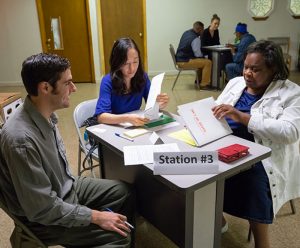
“Advance planning for medical decisions and preferences is never an easy conversation to have with loved ones, but it is a necessary and responsible thing to do,” explains Cowart. “The students from the College of Law, under Professor McNeal’s leadership, filled a significant void within our community.”
Research estimates that only one in three Americans has an advance directive, a number that is substantially lower among communities of color, those of lower socio-economic status, and lower levels of education. This semester, College of Law students in McNeal’s Advance Directives in the Community course and Elder and Health Law Clinic (EHLC) gained hands-on experience educating local residents about the importance of planning for end-of-life care while helping them prepare advance directives in partnership with Falk College.
“Advance directives enable people to appoint a proxy to make decisions when they are no longer able to, and they lay out a person’s preferences for the care they want,” says McNeal. Providing general practice legal assistance for those aged 60 and over with low or moderate incomes, the EHLC offers students the opportunity to represent clients with faculty guidance and oversight.
